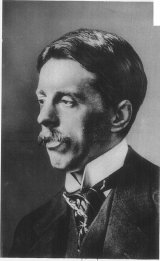Paris Nights and Other Impressions of Places and People Page #4
Enoch Arnold Bennett (27 May 1867 - 27 March 1931) was an English writer. He is best known as a novelist, but he also worked in other fields such as the theatre, journalism, propaganda and films. Bennett was born in a modest house in Hanley in the Potteries district of Staffordshire. Hanley was one of the Six Towns that were joined together at the beginning of the 20th century as Stoke-on-Trent and are depicted as "the Five Towns" in some of Bennett's novels. Enoch Bennett, his father, qualified as a solicitor in 1876, and the family moved to a larger house between Hanley and Burslem.
- Year:
- 1913
- 108,201 Views
Beyond question the troupe of favourites considers itself to be the real centre of Paris, and, therefore, of civilisation. Practically the entire Press, either by good nature, stupidity, snobbishness, or simple cash transactions, takes part in the vast make-believe that the troupe is conferring a favour on civilisation by consenting to be alive. And the troupe of course behaves accordingly. It puts its back into the evening when it thinks it will, and when it thinks it won’t, it doesn’t. “Aux Variétés on travaille quand on a le temps.” The rise of the curtain awaits the caprice of a convivial green-room. “Don’t hurry--the public is getting impatient.” Naturally, the underlings are not included in the benefits of the make-believe. “At rehearsals we may wait two hours for the principals,” a chorus-girl said to me. “But if we are five minutes late, one flings us a fine. A hundred francs a month I touch, and it has happened to me to pay thirty in fines. Some one gets all that, you know!” She went off into an impassioned description of scenes at rehearsals of a ballet, how the ballet-master, after epical outbursts, would always throw up his arms in inexpressible disgust and retire to his room, and how the women would follow him and kiss and cajole and hug him, and how then, after a majestic pause, his step could be heard slowly descending the stairs, and at last the rehearsal would resume.... The human interest, no doubt! The Variétés has another rôle and justification. It is what the French call a women’s theatre. When I asked a well-known actress why the entr’-actes at the Variétés were so long, she replied with her air of finding even the most bizarre phenomena quite natural: “There are several reasons. One is, so that the gentlemen may have time to write notes and to receive answers.” I did not conceal my sense of the oddness of this method of conducting a theatre, whereupon she reminded me that it was the Variétés we were talking about. She said that little by little I should understand all sorts of things. ***** As the principal piece progressed--it was an opérette--the apathy of the public grew more and more noticeable. They seemed to have forgotten that they were in one of the most truly Parisian of theatres, watching players whose names were household words and synonyms of wit and allurement. There was no applause, save from a claque which had carried discipline to the extreme. The favourites were evidently in one of their moods of casualness. Either the piece had run too long or it was not going to run long enough. It was a piece brightly and jinglingly vulgar, ministering, of course, in the main, to the secret concupiscence which drives humanity forward; titillating, like most stage-spectacles, all that is base, inept, and gross in a crowd whose units are perhaps, not quite odious. A few of the performers had moments of real brilliance. But even these flashes did not stir the public, whose characteristic was stolidity. A public which, having regard to the conditions of the particular theatre, necessarily consisted of simple snobbish gulls whose creed is whatever they read or hear, with an admixture of foreigners, provincials, adventurers, and persons who, having no illusions, go to the Variétés because they have been to everything else and must go somewhere! The first half-dozen rows of the stalls were reserved for males: a custom which at the Variétés has survived from a more barbaric age, as the custom of the finger-bowl has survived in the repasts of the polite. The self-satisfied and self-conscious occupants of these rows seemed to summarise and illustrate all the various masculine stupidity of a great and proud city. To counterbalance this preponderance of the male, I could glimpse, behind the lath grilles of the cages called baignoires, the forms of women (each guarded) who I hope were incomparable. The sight of these grilles at once sent the mind to the seraglio, and the House of Commons, and other fastnesses of Orientalism. The evening was interminable, not for me alone, but obviously for the majority of the audience. Impossible to describe the dull fortitude of the audience without being accused of wilful exaggeration! Only in the entr’actes, in the amplitude and dubious mystery of the entr’actes, did the audience arouse itself into the semblance of vivacity. There was but little complaining. Were we not at the Variétés? At the Variétés, to suffer was part of the entertainment. The French public is a public which accepts all in Christian meekness--all! It knows that it exists for the convenience of the bureaucracy and the theatres. It covers its cowardice under a mantle of philosophy and politeness. Its fierce protest is a shrug. “Que voulez-vous? C’est comme ça.” ***** At last, at nearly half after midnight, we came forth, bitterly depressed, as usual, by the deep consciousness of futile waste. I could see, in my preoccupation, the whole organism of the Variétés, which is only the essence of the French theatre. A few artistes and a financier or so at the core, wilful, corrupt, self-indulgent, spoiled, venal, enormously unbusinesslike, incredibly cynical, luxurious in the midst of a crowd of miserable parasites and menials; creating for themselves, out of electric globes, and newspapers, and posters, and photographs, and the inexhaustible simplicity and sexuality of the public, a legend of artistic greatness. They make a frame, and hang a curtain in front of it, and put footlights beneath; and lo! the capricious manouvres of these mortals become the sacred, authoritative functioning of an institution! It was raining. The boulevard was a mirror. And along the reflecting surface of this mirror cab after cab, hundreds of cabs, rolled swiftly. Dozens and dozens were empty, and had no goal; but none would stop. They all went ruthlessly by with offensive gestures of disdain. Strangers cannot believe that when a Paris cabman without a fare refuses to stop on a wet night, it is not because he is hoping for a client in richer furs, or because he is going to the stables, or because he has earned enough that night, or because he has an urgent appointment with his enchantress--but simply from malice. Nevertheless this is a psychological fact which any experienced Parisian will confirm. On a wet night the cabman revenges himself upon the bourgeoisie though the base satisfaction may cost him money. As we waited, with many other princes of the earth who could afford to throw away a whole louis for a few hours’ relaxation, as we waited vainly in the wet for a cabman who would condescend, I could savour only one sensation--that of exasperating tedium completely achieved.
Translation
Translate and read this book in other languages:
Select another language:
- - Select -
- 简体中文 (Chinese - Simplified)
- 繁體中文 (Chinese - Traditional)
- Español (Spanish)
- Esperanto (Esperanto)
- 日本語 (Japanese)
- Português (Portuguese)
- Deutsch (German)
- العربية (Arabic)
- Français (French)
- Русский (Russian)
- ಕನ್ನಡ (Kannada)
- 한국어 (Korean)
- עברית (Hebrew)
- Gaeilge (Irish)
- Українська (Ukrainian)
- اردو (Urdu)
- Magyar (Hungarian)
- मानक हिन्दी (Hindi)
- Indonesia (Indonesian)
- Italiano (Italian)
- தமிழ் (Tamil)
- Türkçe (Turkish)
- తెలుగు (Telugu)
- ภาษาไทย (Thai)
- Tiếng Việt (Vietnamese)
- Čeština (Czech)
- Polski (Polish)
- Bahasa Indonesia (Indonesian)
- Românește (Romanian)
- Nederlands (Dutch)
- Ελληνικά (Greek)
- Latinum (Latin)
- Svenska (Swedish)
- Dansk (Danish)
- Suomi (Finnish)
- فارسی (Persian)
- ייִדיש (Yiddish)
- հայերեն (Armenian)
- Norsk (Norwegian)
- English (English)
Citation
Use the citation below to add this book to your bibliography:
Style:MLAChicagoAPA
"Paris Nights and Other Impressions of Places and People Books." Literature.com. STANDS4 LLC, 2025. Web. 10 Mar. 2025. <https://www.literature.com/book/paris_nights_and_other_impressions_of_places_and_people_110>.








Discuss this Paris Nights and Other Impressions of Places and People book with the community:
Report Comment
We're doing our best to make sure our content is useful, accurate and safe.
If by any chance you spot an inappropriate comment while navigating through our website please use this form to let us know, and we'll take care of it shortly.
Attachment
You need to be logged in to favorite.
Log In